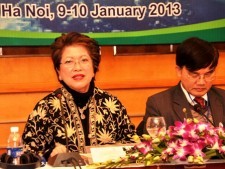
HANOI, January 9, 2013 -- Thank you for the opportunity to welcome you to this important global climate change initiative of the United States Government on Enhancing Capacity for Low Emission Development Strategies (EC-LEDS).
The U.S. Government launched the EC-LEDS initiative more than two years ago to support developing country-led efforts to accelerate their economic growth, achieve their development goals, and address climate change. Vietnam was one of our first partners and we are privileged to work with you in this endeavor.
The EC-LEDS program is a flagship program for President Obama's Global Climate Change Initiative. And thanks to the positive and enthusiastic response from our partner countries, we have launched partnerships with 25 countries.
The EC-LEDS program is part of a larger focus by USAID Administrator Rajiv Shah on multi-year strategic development assistance and planning based on strong analysis and priority setting.
The EC-LEDS is a global effort to curb long-term greenhouse gas emissions, and assistance to partner countries to attract investment, encourage private sector growth, improve the lives of their people and thus achieve long-term, sustainable development.
The EC-LEDS program is tailored to each country's unique capacity, technical, analytical, and policy needs.
The EC-LEDS program builds on existing climate change-related plans and strategies of each country. These efforts address gaps, strengthen data and analysis, target actions for implementation, and build capacities through technical assistance and training.
The EC-LEDS is working with partner countries to build capacity of their government and institutions to develop and implement their respective Low Emission Development Strategies, on key skills and tools, such as economic modeling, emission inventories, and institutional strengthening. Our aim is to develop analytical capacity for developing a climate-resilient, low emission development pathway and for implementing the programs needed to achieve this pathway.
EC-LEDS mobilizes the expertise of multiple U.S. agencies involving the U.S. Department of Energy and its National Labs, the U.S. Forest Service, the U.S. Departments of Agriculture, Environmental Protection Agency, and other agencies to promote sound science and technological solutions across key economic sectors.
This workshop focuses specifically on the very important issue of renewable energy resource assessment and the use of these data for project development and planning. Clean energy provides many win-win opportunities by advancing the use of domestic resources in support of energy security while also accelerating development and economic growth through broader access to reliable supply of energy.
Over the next two days, we will learn from both Vietnamese and US experts about Vietnam's abundant renewable energy resources that could help meet the country's green growth development and climate change strategy goals.
I would like to specially thank the New and Renewable Energy Department of the General Directorate of Energy, Ministry of Industry and Trade, the Centre for Renewable Energy and Climate Change of the Institute of Energy, Hanoi University of Technology, and our colleagues from World Bank and GIZ for their active participation in this workshop.
I hope that these collaborative activities as well as the tools, data, and methods shared during this workshop will help both of our countries to meet our economic growth and environmental objectives.
On behalf of our USAID team and the National Renewable Energy Laboratory, I thank you again for joining us and I wish you great success with this workshop.







Comment
Make a general inquiry or suggest an improvement.